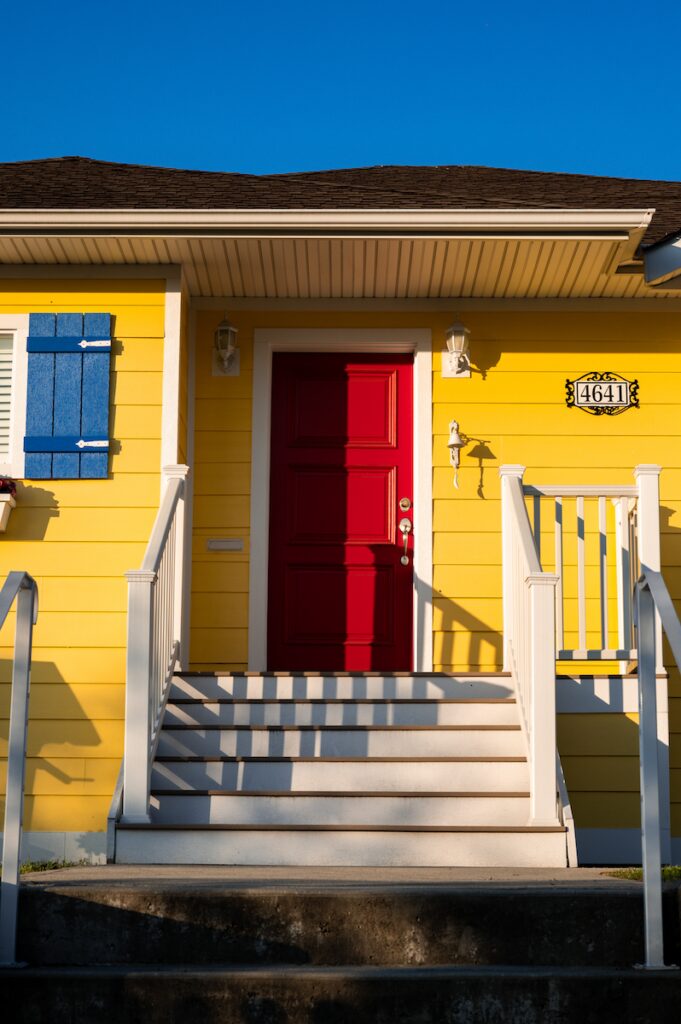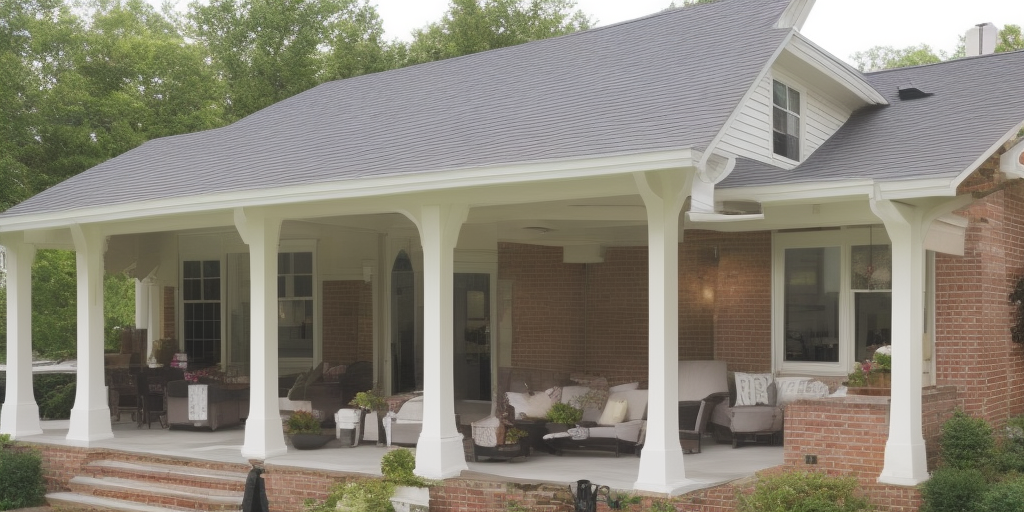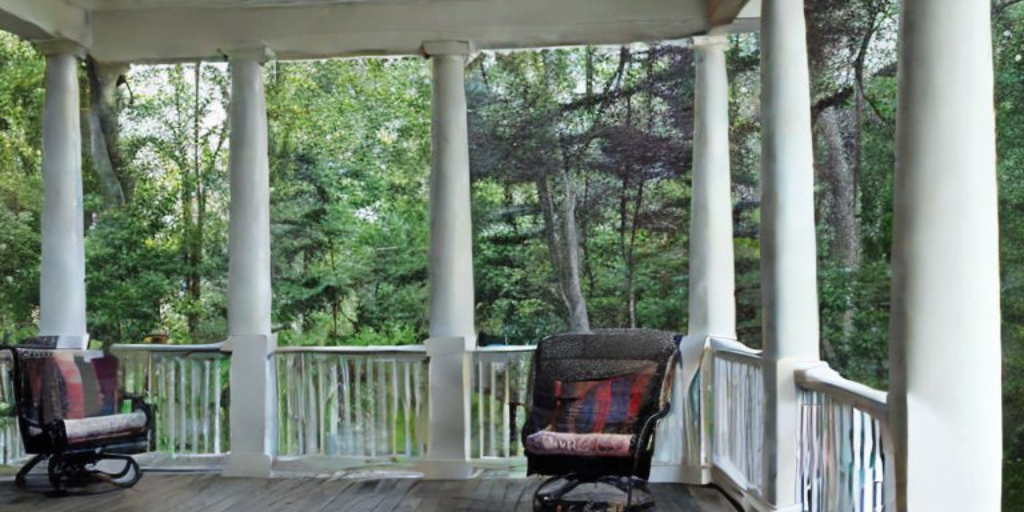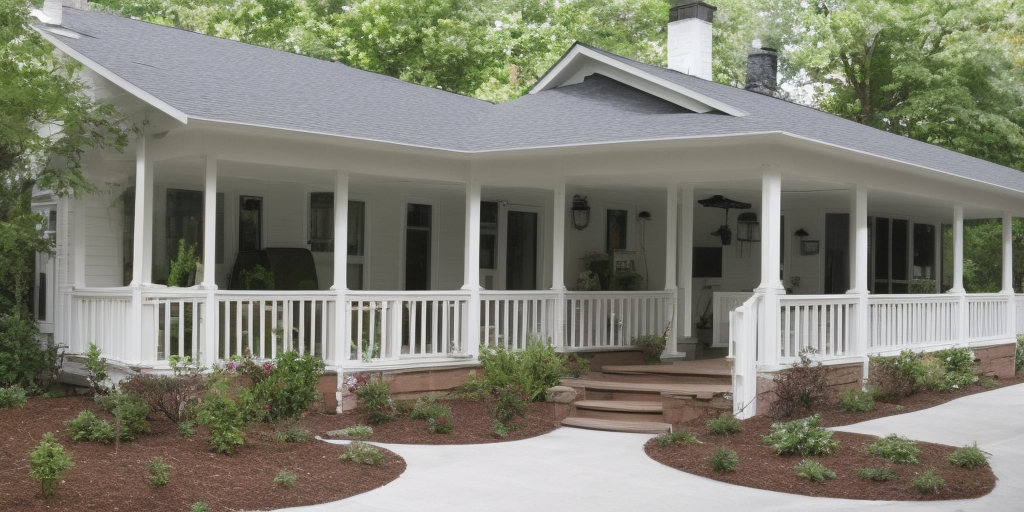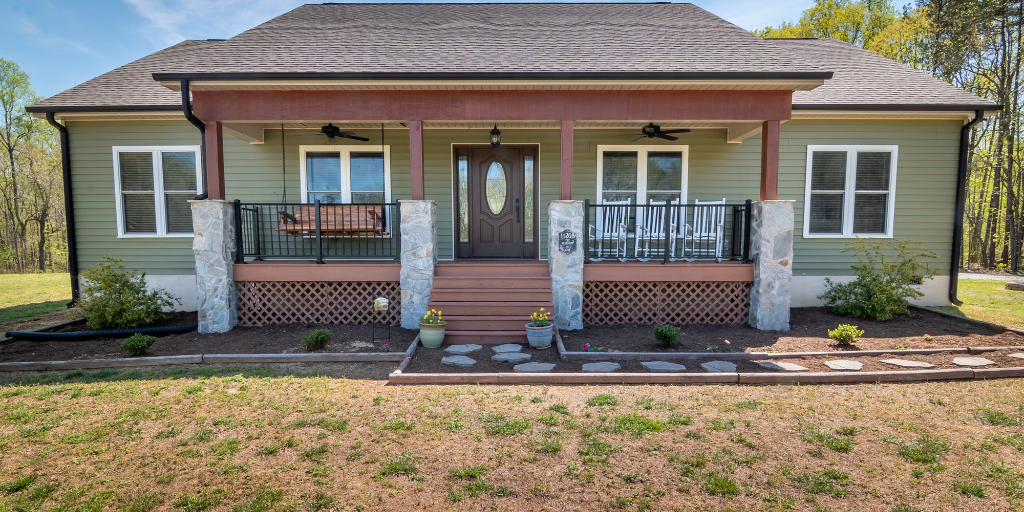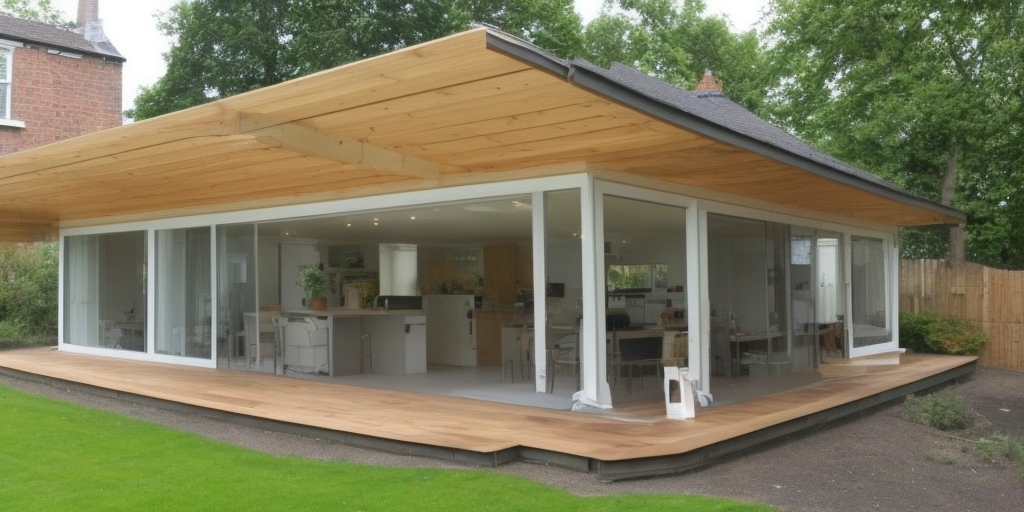Can I make my porch bigger is a common question many homeowners ask as they seek to expand their outdoor living space. If you’re one of such homeowners who loves spending time outdoors, then learning how to extend your living space is a must.
Below we will share many ways to expand your porch and address any related issues around this topic. We’ll explore the different factors that come into play when considering a porch expansion and help you decide whether it’s feasible for your home.
Can I make my porch bigger?
Contents
- 1 Can I make my porch bigger?
- 2 Can I expand my porch if I have a sloped yard?
- 3 What are the zoning regulations for porch expansion?
- 4 How much does it cost to make a porch bigger?
- 5 Can I expand my porch without a building permit?
- 6 What are the common materials used for porch expansion?
- 7 How can I determine if my porch can be expanded?
- 8 Can I make my porch bigger myself or do I need a contractor?
- 9 How long does it take to make a porch bigger?
- 10 What are the design considerations for porch expansion?
- 11 Are there any safety concerns I should be aware of when expanding my porch?
- 12 What are the environmental implications of porch expansion?
- 13 Are there any tax benefits to expanding my porch?
- 14 How does porch expansion affect home value?
- 15 Final thoughts on can I make my porch bigger
Yes, you can make your porch bigger with proper planning and construction. However, expanding your porch may require permits and professional help depending on the extent of the expansion and the building codes and regulations in your area.
Some factors to consider when expanding your porch include the design, materials, foundation, supports, and any necessary electrical or plumbing work. It’s important to carefully plan and budget for your porch expansion project to ensure that it meets your needs and adds value to your home.
It’s also important to consider the environmental and safety implications of porch expansion, such as proper drainage and potential hazards like uneven flooring or inadequate support structures. It is recommended that you consult with a professional to assess your specific situation and develop a plan that meets your needs and local building codes.
Can I expand my porch if I have a sloped yard?
Yes, it is possible to expand your porch even if you have a sloped yard. However, it may require additional planning and construction to ensure that the porch is stable and safe. Here are some factors to consider:
Foundation: A sloped yard may require a more complex foundation to ensure that the porch is level and stable. The foundation may need to be dug deeper into the ground on one side of the porch to create a level base.
Support: The porch will need to be supported by posts or columns that are anchored securely into the ground. These supports will need to be adjusted to accommodate the slope of the yard.
Design: The design of the porch may need to be adjusted to fit the slope of the yard. For example, the porch may need to be built on multiple levels to follow the contours of the yard.
Permits: Expanding your porch may require permits from your local building department. You will need to consult with a professional to ensure that your plans meet local building codes and regulations.
Drainage: If you have a sloped yard, you will need to ensure that the porch has adequate drainage to prevent water from pooling or flowing into your home. This may require additional grading or the installation of drainage systems.
Overall, expanding your porch on a sloped yard is possible, but it requires careful planning and construction to ensure that the porch is safe and stable. It is recommended that you consult with a professional to assess your specific situation and develop a plan that meets your needs and local building codes.
What are the zoning regulations for porch expansion?
Zoning regulations for porch expansion can vary depending on the location of your property and the specific regulations set by your local zoning board. Generally, these regulations can cover several aspects of porch expansion such as setback requirements, height restrictions, and size limitations.
For example, some zoning regulations may require a minimum setback from property lines or other structures, while others may limit the height of the porch. Some areas may also have restrictions on the amount of lot coverage a structure can occupy, which can affect the size of your porch.
It’s important to check with your local zoning board to determine the specific regulations that apply to your property. You may need to submit a permit application and have your porch expansion plans reviewed and approved by the zoning board before you can proceed with construction. Failure to comply with zoning regulations can result in fines or other penalties, so it’s essential to make sure you’re following the rules.
How much does it cost to make a porch bigger?
The cost of making a porch bigger can vary widely depending on several factors such as the size of the porch, the materials used, and the complexity of the project.
In general, expanding a porch can cost anywhere from a few thousand dollars to tens of thousands of dollars. For example, if you’re looking to simply add a few feet onto an existing porch and use the same materials, the cost may be relatively low. On the other hand, if you’re looking to build a much larger porch with premium materials such as composite decking, the cost can be much higher.
Other factors that can impact the cost of expanding a porch include the need for foundation work, electrical or plumbing upgrades, and permits or inspections. Labor costs can also vary depending on the complexity of the project and the experience level of the contractor.
To get an accurate estimate of how much it will cost to make your porch bigger, it’s best to consult with a licensed contractor and obtain a detailed quote based on your specific needs and preferences. However, prices can fall in the thousands.
Can I expand my porch without a building permit?
It is generally not advisable to expand your porch without obtaining the necessary building permits. Most cities and counties require building permits for any construction that involves structural changes to a home or property, including porch expansion.
Building permits are put in place to ensure that any construction work meets safety standards and follows local building codes. Without the proper permits, you may face fines or penalties, and your expansion may be deemed unsafe or non-compliant.
In addition, expanding your porch without a permit can also cause problems when it comes time to sell your home. Home buyers typically hire inspectors to evaluate a property before making a purchase, and any unpermitted work can create a red flag that could result in a lower offer or even a cancelled sale.
To ensure that your porch expansion is safe and legal, it’s important to obtain the necessary building permits before starting any construction work. Contact your local building department to find out what permits and inspections are required for porch expansion in your area.
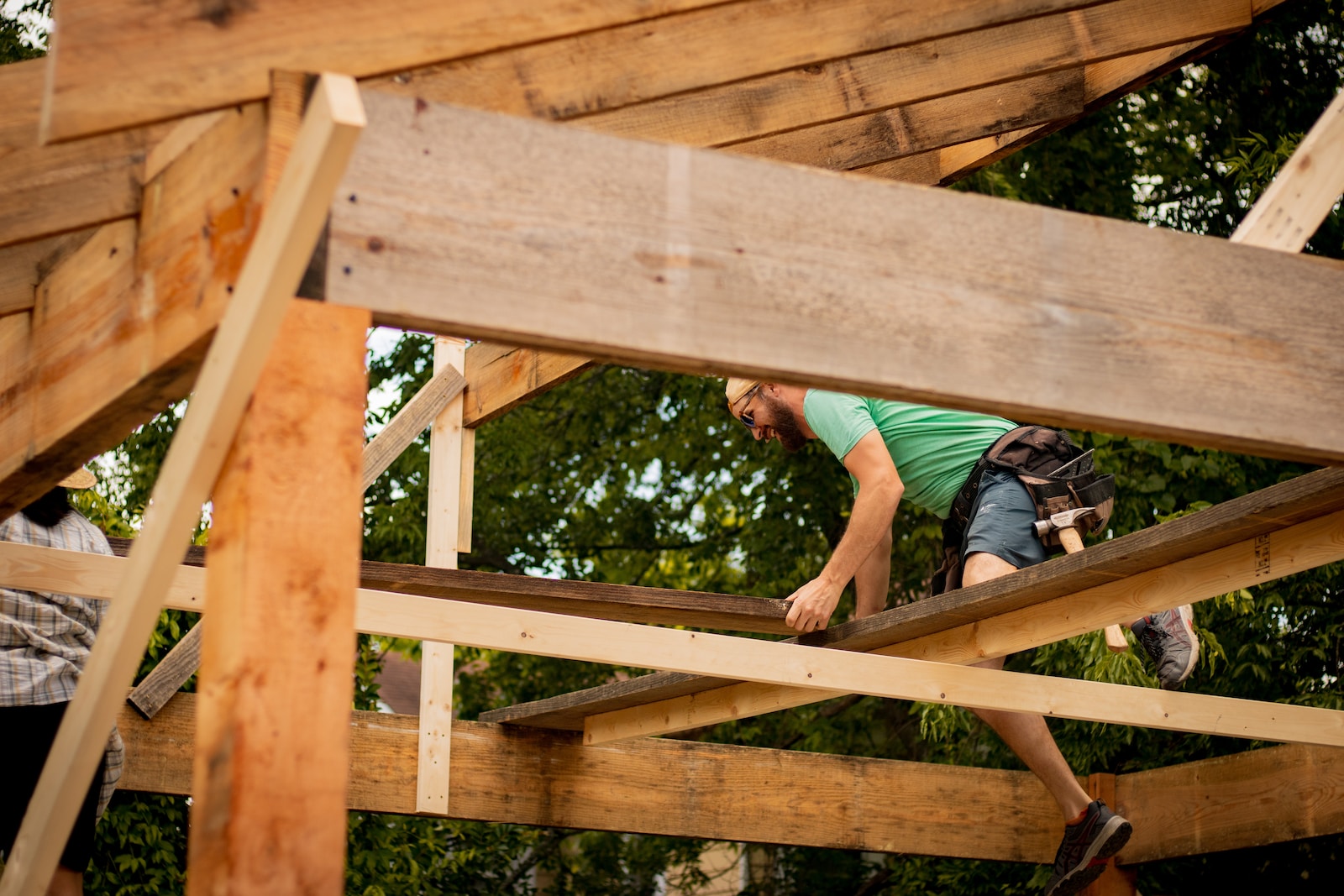

What are the common materials used for porch expansion?
There are many materials that can be used for porch expansion, and the choice will depend on a variety of factors such as your budget, personal style, and the climate in your area. Here are some common materials used for porch expansion:
Wood: Wood is a popular choice for porch flooring, and it can create a classic, traditional look. However, it requires regular maintenance to keep it looking its best.
Composite decking: This is a low-maintenance alternative to wood that is made from a blend of plastic and wood fibers. Composite decking is resistant to rot, insects, and warping, making it a popular choice for porch flooring.
Concrete: Concrete is a durable, long-lasting option for porch flooring, and it can be stamped or stained to create a variety of looks.
Brick or stone pavers: These can create a classic, elegant look for a porch and are available in a variety of colors and patterns.
Vinyl: Vinyl is a low-maintenance option that is resistant to weathering, fading, and insects. It is also available in a variety of colors and patterns.
In addition to the flooring materials, other materials that may be used for porch expansion include railing systems, roofing, and lighting fixtures. It’s important to choose materials that are durable, safe, and appropriate for the climate in your area.
How can I determine if my porch can be expanded?
Determining if your porch can be expanded will depend on a variety of factors such as the structure of your existing porch, the location of your property, and any local building codes or regulations. Here are some steps you can take to determine if your porch can be expanded:
Assess the existing porch structure: The first step is to assess the current structure of your porch. Look for signs of damage or wear and tear, such as rotting wood, cracks, or uneven surfaces. If your porch is in poor condition, it may need to be repaired or replaced before any expansion can take place.
Consider the location: Check local zoning regulations to determine if there are any restrictions on porch size, setback requirements, or height limitations that could affect your plans for expansion. Also, consider the layout of your property and the impact that an expanded porch could have on your neighbors.
Determine the load-bearing capacity: An expanded porch will add weight to the structure, so it’s important to determine the load-bearing capacity of the porch’s foundation and framing. A structural engineer can help you determine if the existing structure can support the additional weight.
Plan for utilities: If you plan to install lighting, ceiling fans, or other fixtures as part of your porch expansion, consider how these will be connected to your home’s electrical or plumbing systems. It may be necessary to run new wiring or plumbing lines to accommodate the expanded porch.
Consult with a professional: It’s always a good idea to consult with a licensed contractor or architect to help you assess the feasibility of expanding your porch. They can provide guidance on the best materials to use, any necessary permits or inspections, and help you create a design that meets your needs and budget.
Can I make my porch bigger myself or do I need a contractor?
Here are some factors to consider when deciding whether to expand your porch yourself or hire a contractor:
Experience: Do you have experience with carpentry, electrical, and plumbing work? Expanding a porch requires a variety of skills, so if you don’t have experience in these areas, it’s best to hire a contractor.
Time: Expanding a porch can be a time-consuming project, especially if you’re doing it yourself. A contractor will have the skills and experience to complete the project more quickly and efficiently.
Permits and inspections: Expanding a porch may require permits and inspections from your local building department. A contractor will be familiar with the local regulations and can handle the permit process for you.
Safety: Expanding a porch can be dangerous, especially if you’re working at heights or with power tools. A contractor will have the necessary safety equipment and training to ensure the job is done safely.
Cost: While it may be tempting to do the project yourself to save money, a contractor can often get better prices on materials and can complete the project more efficiently, which can save you money in the long run.
In conclusion, while expanding your porch yourself may seem like a cost-saving measure, it’s important to consider your level of expertise and the scope of the project before making a decision.
How long does it take to make a porch bigger?
The length of time it takes to make a porch bigger will depend on several factors, such as the size of the porch, the materials used, and the complexity of the project. It’s difficult to give a specific timeframe without knowing the details of your project. However, here are some factors that can impact the timeline:
Design phase: The design phase is an important step in expanding a porch, as it involves creating plans and obtaining any necessary permits. This phase can take anywhere from a few weeks to a few months, depending on the complexity of the project and the time it takes to obtain permits.
Demolition and site preparation: If any existing structures need to be removed, such as railings or steps, this can take several days. The site may also need to be graded or leveled, which can add additional time.
Framing: The framing phase involves building the structure of the expanded porch. This can take several days to a few weeks, depending on the size and complexity of the project.
Roofing and flooring: Once the framing is complete, the roofing and flooring can be installed. This can take several days to a week or more, depending on the materials used.
Finishing touches: Once the major construction is complete, the finishing touches such as painting, installing fixtures, and adding decorations can be completed. This can take several days to a few weeks, depending on the complexity of the project.
In general, a porch expansion project can take anywhere from a few weeks to a few months to complete, depending on the scope of the project and any unforeseen issues that may arise.
What are the design considerations for porch expansion?
Expanding your porch is a great way to increase your living space and add value to your home. However, there are several design considerations to keep in mind when planning your porch expansion project. Here are some factors to consider:
Porch style: The style of your porch should complement the style of your home. If your home has a traditional style, a porch with a more classic design may be a good fit. For a modern home, a porch with clean lines and minimal ornamentation may be more appropriate.
Size: The size of your porch expansion should be proportionate to your home and your needs. If you plan to use your porch for entertaining, you’ll need more space than if you plan to use it for relaxation or as a reading nook.
Materials: The materials you choose for your porch expansion will impact its durability, maintenance, and aesthetic appeal. Wood is a popular choice for porches, but it requires regular maintenance. Composite decking is another option that requires less maintenance but can be more expensive.
Lighting: Proper lighting is important for safety and to create ambiance. Consider adding light fixtures or solar lights to your porch expansion to make it functional and welcoming.
Ventilation: Good ventilation is important for the comfort of those using the porch. Consider adding ceiling fans or screened windows to keep the porch cool and comfortable.
Accessibility: If you plan to use your porch for years to come, consider making it accessible. This can include installing a ramp, wider doorways, and zero-step entryways.
Designing a porch expansion involves careful consideration of the style, size, materials, lighting, ventilation, and accessibility. By taking these factors into account, you can create a porch expansion that not only enhances the beauty and value of your home but also meets your functional needs.
Are there any safety concerns I should be aware of when expanding my porch?
Yes, safety is a very important consideration when expanding your porch. Here are some safety concerns you should be aware of:
Building codes: Before beginning your porch expansion project, check your local building codes to ensure that you are in compliance with safety regulations. This includes requirements for minimum railing height, spacing between balusters, and proper attachment to the house.
Structural integrity: Your porch expansion must be structurally sound and able to support the additional weight. This includes the weight of the new roof, flooring, furniture, and people. Consider hiring a structural engineer to evaluate your porch and determine if any additional supports or reinforcements are needed.
Electrical safety: If you plan to add electrical outlets, lighting fixtures, or ceiling fans to your porch expansion, it’s important to have a licensed electrician perform the installation. This will ensure that the electrical work is done safely and meets code requirements.
Slip-resistant flooring: To prevent slips and falls, it’s important to choose slip-resistant flooring materials for your porch expansion. This is especially important if your porch will be exposed to rain, snow, or ice.
Lighting: Adequate lighting is important for safety on your porch, especially at night. Consider installing motion-sensor lights or timed lights to ensure that your porch is well-lit.
Fire safety: If you plan to use your porch for grilling or outdoor cooking, make sure to follow proper safety precautions. Keep flammable materials away from the grill and have a fire extinguisher nearby.
Safety is an important consideration when expanding your porch. By following building codes, ensuring structural integrity, hiring licensed professionals for electrical work, choosing slip-resistant flooring, installing adequate lighting, and following fire safety guidelines, you can help ensure that your porch expansion is a safe and enjoyable space for years to come.
What are the environmental implications of porch expansion?
Porch expansion can have both positive and negative environmental implications. Here are some factors to consider:
Energy efficiency: Adding a porch can provide shade and reduce solar gain, which can help reduce energy costs associated with air conditioning in the summer. However, the additional roof area can also increase heat gain in the winter, potentially increasing heating costs.
Materials: The materials used in porch construction can have environmental implications. Wood is a renewable resource, but can be sourced from unsustainable forestry practices. Composite decking is made from recycled materials but can be difficult to recycle at the end of its lifespan.
Water runoff: Porch expansion can increase impervious surfaces, leading to increased water runoff and potential flooding. Consider using permeable materials for flooring or installing a rain garden to help manage water runoff.
Wildlife habitat: A porch expansion can alter the natural habitat of wildlife. Consider planting native plants in landscaping and avoiding the use of pesticides to help support local wildlife.
Maintenance: Maintenance of the porch expansion can also have environmental implications. Consider using environmentally friendly cleaners and avoiding chemical treatments that can harm wildlife and water quality.
Porch expansion can have both positive and negative environmental implications. By considering energy efficiency, materials, water runoff, wildlife habitat, and maintenance, you can help minimize the negative impacts and create a porch expansion that is environmentally sustainable.
Are there any tax benefits to expanding my porch?
In general, there are no tax benefits specifically for expanding your porch. However, some improvements to your home can increase its value, which can result in tax benefits when you sell your home. Here are a few things to keep in mind:
Capital gains: When you sell your home, any profit you make over the amount you paid for it is considered a capital gain. If you’ve lived in the home for at least two of the past five years, you can exclude up to $250,000 of that gain ($500,000 for married couples) from your taxable income. Improvements to your home, such as expanding your porch, can increase its value and help you realize a larger capital gain.
Home office deduction: If you use your porch expansion as a home office, you may be eligible for a home office deduction on your taxes. This deduction allows you to deduct a portion of your home expenses, such as mortgage interest and property taxes, based on the percentage of your home that is used as a home office.
Energy-efficient upgrades: If your porch expansion includes energy-efficient upgrades, such as insulated walls or windows, you may be eligible for tax credits or other incentives. The federal government and some state governments offer tax credits and incentives for energy-efficient upgrades that meet certain criteria.
It’s always a good idea to consult with a tax professional to determine the specific tax implications of any home improvement project, including porch expansion.
How does porch expansion affect home value?
Porch expansion can be a valuable home improvement project that can positively impact the value of your home. Here are some ways in which porch expansion can affect home value:
Increased living space: Porch expansion can increase the living space of your home, providing you with additional space for relaxation, entertainment, or storage. This added square footage can increase the overall value of your home.
Enhanced curb appeal: A porch expansion can enhance the curb appeal of your home, making it more attractive to potential buyers. A well-designed porch can add charm and character to your home, which can increase its perceived value.
Improved functionality: A porch expansion can improve the functionality of your home by providing additional outdoor living space that can be used for a variety of purposes. For example, a porch expansion can be used for outdoor dining, entertaining, or relaxing.
Energy efficiency: If your porch expansion includes energy-efficient upgrades, such as insulated walls or windows, it can improve the energy efficiency of your home. This can be a valuable selling point for potential buyers who are looking for a home that is environmentally friendly and energy efficient.
Market demand: The value of porch expansion also depends on the demand for it in the market. In areas where outdoor living space is highly valued, porch expansion can have a significant impact on home value. However, in areas where outdoor living space is not a priority, the impact on home value may be less significant.
Overall, porch expansion can increase the value of your home in various ways. It’s important to consider your local real estate market and the preferences of potential buyers in your area to determine the potential impact on your home value.
Final thoughts on can I make my porch bigger
In answer to the question can I make my porch bigger, it is certainly possible, but it requires careful consideration of various factors such as your budget, zoning regulations, and structural limitations.
If you don’t have the know how, it’s better to work with a professional contractor to ensure that your porch expansion meets safety codes and is built to last. With the right planning and execution, you can create a porch that not only enhances your home’s aesthetics but also provides ample space for relaxation and entertainment.
